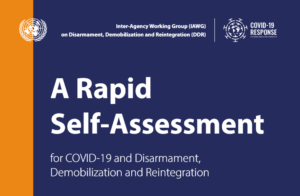Overview of the Rapid Self-Assessment
 The World Health Organization (WHO) characterized the coronavirus disease (COVID-19) as a pandemic on 11 March 2020. The consequences of this global health crisis are still unfolding, with profound implications for the lives of all people in the world. In conflict-affected and fragile States, the health crisis makes even more complex an already insecure environment or risks increasing existing high levels of insecurity where armed groups chose to exploit health vulnerabilities and movement restrictions as war tactic. The secondary socio-economic impacts of measures imposed by governments to contain the pandemic may also have negative effects on social cohesion, create competition for already scarce resources, and increase violence of all kinds, not only armed conflict.
The World Health Organization (WHO) characterized the coronavirus disease (COVID-19) as a pandemic on 11 March 2020. The consequences of this global health crisis are still unfolding, with profound implications for the lives of all people in the world. In conflict-affected and fragile States, the health crisis makes even more complex an already insecure environment or risks increasing existing high levels of insecurity where armed groups chose to exploit health vulnerabilities and movement restrictions as war tactic. The secondary socio-economic impacts of measures imposed by governments to contain the pandemic may also have negative effects on social cohesion, create competition for already scarce resources, and increase violence of all kinds, not only armed conflict.
The implementation of disarmament, demobilization and reintegration (DDR) at regional, national and sub-national levels is also impacted by COVID-19. Beyond the direct impact of COVID-19, changes in the context that may require halting implementation of activities or repurposing of funds which are usually related to DDR. COVID-19 also impacts other initiatives relevant for DDR (for example, security sector reform or transitional justice). Furthermore, the pandemic may aggravate root causes of conflict and increase inter-communal tensions, which could endanger the success of DDR processes and peacebuilding at large.
At the same time, DDR practitioners can continue to implement critical activities and contribute to the COVID-19 response led by governments and public health authorities at the preparedness, response and recovery stages. Support to DDR processes should continue in an adapted manner and be reinforced to protect and support participants in a gender-responsive manner, so as to ensure that no one is left behind, in particular persons with specific needs, in the COVID-19 response.
This COVID-19 and DDR rapid self-assessment was formulated to better equip DDR practitioners with a tool to identify key steps and actions to be considered for national DDR processes and programmes and local projects currently under implementation:
- Duty of care: occupational and safety, including gender and age considerations and protection against sexual exploitation and abuse;
- Programme criticality against risk levels;
- Operations/implementation continuity;
- Information handling, communication and safeguarding of privacy;
- Planning DDR in times of COVID-19; vi) COVID-19-sensitive disarmament and demobilization, including child-specific DDR;
- COVID-19-sensitive reintegration, including contributions to the COVID-19 recovery;
- COVID-19-sensitive implementation of DDR-related tools;
- Opportunities for DDR brought forward by the UN Secretary-General’s Appeal for global ceasefire.
All steps can be considered and adapted to the preparedness, response or recovery phases of the pandemic.
Principles Guiding the Rapid Self-Assessment
DDR processes shall support immediate cessation of hostilities, in line with the UN Secretary General’s Appeal for a global ceasefire and peacebuilding efforts, to allow public health containment, control and unhindered implementation of mitigation measures.
DDR processes and children’s release and reintegration are critical life-saving interventions and should continue without any preconditions during the COVID-19 pandemic in accordance with international humanitarian and human rights law and principles. The best interests of the children should be a primary consideration in all decisions affecting children.
DDR personnel and programmatic activities shall take steps to implement infection prevention and control (IPC) measures as recommended by health authorities to minimize the risk of them becoming vectors of transmission of the virus.
DDR processes shall support local efforts and resilience measures including local solutions and support for the protection of, and support for, individuals, communities, including sources of economic activity and livelihoods.
The rapid self-assessment takes place within the context of national/local public health measures and broader organizational emergency preparedness plans. It may therefore need to be customized to social protection measures and economic rescue packages adopted by governments in a gender-responsive manner.
The self-assessment is to be used along with the Integrated Disarmament and Demobilization Standards (IDDRS), including the Module 5.70 on Health and DDR, and national DDR normative and policy frameworks and related measures. The Rapid Assessment steps are also to be applied consistently with the WHO guidelines.
Risks associated with ensuring the continuity of DDR operations should not be transferred from programme entities to implementing partners or from international to national or local partners. Local implementing partners’ continued operation should be contingent to the adoption of acceptable risks and appropriate mitigation strategies.
DDR contributions to COVID-19 preparedness require engaging with country-level multi-sectoral and multi-partner coordination mechanisms to support response at all levels – whole-of-government; whole-of-society and whole-of-UN – across humanitarian-development-peace nexus.
